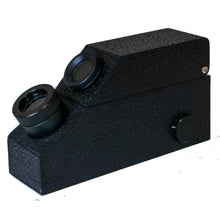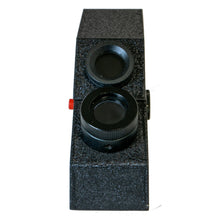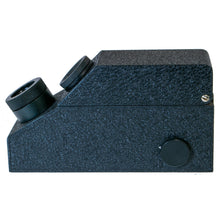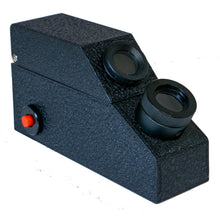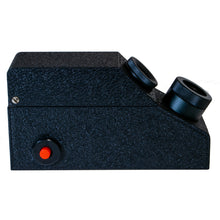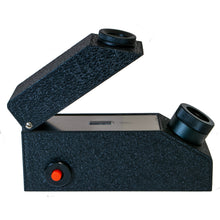
Pickup available from Quicktest (WD18 8JA)
Email us
or call on 01923-220206 for appointment.
Summary
For the gemmologist the refractometer is the most important gem tester after a loupe. It measures refractive index (to what extent light is bent as it passes through the gemstone).
This product is intended for gemmologists (or those about to study gemmology) - instructions are not included.
Guarantee: 1 year.
Detail
Approx. 5 X 3 X 2 inches
Built-in monochromatic LED light
Range: 1.30 to 1.81
Possible error in readings: +/- 0.01
Test plate made of high-refractive glass
Power: Takes 3 size LR44 batteries (included).
Bottle of contact fluid included.
Is it easy to use?
BASIC OPERATION: Rest the flat polished surface of the stone on the test plate, and through the viewfinder you see a scale, part of which will be light and part of which will be dark. In between the light and dark is the 'shadow edge' (which will be quite sharp, due the monochromatic light) - this marks a reading on a scale. It's a little slow and fiddly but not too difficult to master.
ADVANCED OPERATION: Not only do you get a reading, but often you will see two shadow edges, indicating a doubly refractive stone (which, itself, is diagnostic), AND advanced users can glean further information by rotating the stone to see if either or both of the shadow edges move, and by taking minimum and maximum readings for each.
Alternative gem testers
Please note, none of these testers will distinguish natural stones from synthetic stones. "Synthetic" is a scientific term meaning 'made by man in a factory/laboratory to the same formula found in nature', the two are usually indistinguishable.
|
Model |
Tests mounted stones [1] |
Tests Diamond |
Tests Moissanite |
Tests |
Other stones |
|
✔ |
✔ |
Shows up as diamond |
✔ |
31 stones |
|
|
✔ |
✔ |
Shows up as diamond |
✔ |
17 stones |
|
|
[2] |
✔ |
✔ |
✔ |
[3] |
|
|
✘ |
✔ |
✔ |
✔ |
55 stones |
[1] All testers test loose stones but not all can test mounted (set in jewellery) stones.
[2] The probe / analogue meter will test mounted stones, the digital meter will only test loose stones.
[3] The probe / analogue meter: 17 stones; the digital meter: 40 stones.
[4] Skill and practice is required to use an optical refractometer, instructions are not included, see any textbook about gemmology…or the internet.
Limitations
Although this is an 'easy' test because you end up with a number, and you look up the number on standard charts, you will soon discover that (as with all gem testers) there are many gemstones with the same (or overlapping) readings. A refractometer will help you narrow the possibilities to a handful (maybe one or two) stones, but it will not give an instant 100% guaranteed answer.
Some stones are out of range for this machine (their refractive index is too high to be measured) including some garnets, diamonds and most diamond simulants including zircon and sphene. This cannot, therefore, be used as a diamond tester.
Free gift details
If you would like one of the following free gifts with this product, select one from “Select your free gift” above.
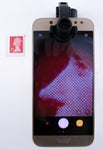
|
Phone microscope, 90X [cl] (RRP £9.50 ) |
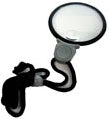
|
Pendant magnifier on cord [cl] (RRP £3.50 ) |
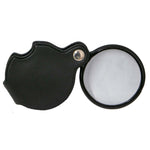
|
Folding Magnifier - round, in soft case (RRP £2.90 ) |
QUESTIONS & ANSWERS
Ask a Question-
Is the light source internal and if so is it monochromatic and is there a way to change the bulb? Or is the light source a separate compnant?
The light source is internal and is monochromatic.
It's an LED light, there is no 'bulb' and it can't be changed, but it should last a few thousands of hours.
-
Is it possible to test mounted stones on this refractometer?
The refractometer is designed for loose stones. But providing the stone can be laid flat on the test-plate so that it makes good contact – yes, it will work fine.
However:
- it depends on how the stone is set. With claw-set stones (most items!) the claws get in the way, you can’t get the stone to make contact.
- large items such as bangles and bracelets will be too large and awkward to fit on the test-plate.
-
I am guessing you can't test rough stones with this, right?
Correct.
The stone has to have a perfectly flat perfeclty polished surface.







